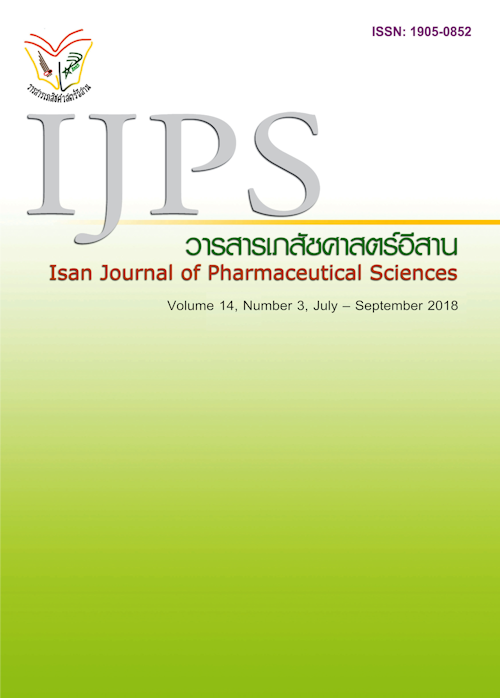Level of leadership, leadership development in pharmacy schools and Predicting factors of sixth year pharmacy students’ leadership
Main Article Content
Abstract
Leadership is one of essential competencies for pharmacy professionals which can be developed throughout pharmacy school. Some pharmacy schools have developed and provided elective leadership courses to their students. In Thailand, leadership and practice management is also one of required professional standards of hospital pharmacists. Therefore, this study aimed to evaluate sixth year pharmacy students’ leadership and involving factors. Methods: The objectives of this analytical and cross-sectional study were to study leadership level in sixth year pharmacy students, influencing factors among 4 public pharmacy schools in the central region of Thailand and pharmacy curricula. There were 526 questionnaires distributed and 387 questionnaires were returned which meant 73.57% response. Four pharmacy curricula were collected and reviewed to evaluate courses and way to leadership development. Descriptive statistics, T-test, One-way ANOVA, and Least Significant Difference (LSD) and Multiple Regression Analysis were performed to analyze quantitative data. Data extraction method was used to analyze qualitative data. Results: Sixth year pharmacy students among 4 pharmacy schools had average score in leadership in high level (3.96 ± 0.42). About 39.79% of them experienced working as a leader during period of education. Perceptions, attitudes toward leadership and gender were three factors that can be used to predict leadership level 26.40%. Many communication and management courses are available in the pharmacy curriculum. There were 17 – 23 credits throughout pharmacy curricula. But official leadership courses are not available in any pharmacy school. Students developed their leadership skill by learning activities in the classroom. Conclusion: Leadership courses and various learning activities should be implemented in pharmacy curricula in order to shape pharmacy students’ attitudes and perceptions on leadership development and continuously develop their leadership skills.
Article Details
In the case that some parts are used by others The author must Confirm that obtaining permission to use some of the original authors. And must attach evidence That the permission has been included
References
Aarons GA. Transformational and Transactional Leadership: Association With Attitudes Toward Evidence-Based Practice. PS 2006; 57(8): 1162-9.
Allen RE, Copeland J, Franks AS, Karimi R, McCollum M, Riese DJ, 2nd, et al. Team-based learning in US colleges and schools of pharmacy. AJPE 2013; 77(6): 115.
Andersen JA, Hansson PH. At the end of the road? On differences between women and men in leadership behaviour. LODJ 2011; 32(5): 428-41.
Azmi S, Nazri N, Azmi AH. Extending the roles of community pharmacists: views from general medical practitioners. MJM 2012; 67(6): 577-81.
Blanch DC, Hall JA, Roter DL, Frankel RM. Medical student gender and issues of confidence. PEC 2008; 72(3): 374-81.
Bock GW, Zmud RW, Kim YG, Lee JN. Behavioral Intention Formation in Knowledge Sharing: Examining the Roles of Extrinsic Motivators, Social-Psychological Forces, and Organizational Climate. MIS Quarterly 2005; 29(1): 87-111.
Bradley-Baker LR, Murphy NL. Leadership Development of Student Pharmacists. AJPE 2013; 77(10): 219.
Chesnut R, Tran-Johnson J. Impact of a Student Leadership Development Program. AJPE 2013; 77(10): 225.
Department of Pharmacy. Professional standards of hospital pharmacists: Phase II 2003-2005. ThaiHP 2013.
DuBois S. 5 professions ruled by women [Online]. 2013 [cited 2016 Jan 28]. Available from: http://fortune.com/2013/03/11/5-professions-ruled-by-women/
Gotham HJ. Diffusion of mental health and substance abuse treatments: development, dissemination, and implementation. CPSP 2004; 161: 11-76.
Karp T. Leaders need to develop their willpower. JMD 2014; 33(3): 150-63.
Keating K, Rosch D, Burgoon L. Developmental Readiness for Leadership: The Differential Effects of Leadership Courses on Creating “Ready, Willing, and Able” Leaders. JOLE 2014; 13(3): 1-16.
Kerr RA, Beck DE, Doss J, Draugalis JR, Huang E, Irwin A, et al. Building a sustainable system of leadership development for pharmacy: report of the 2008-09 Argus Commission. AJPE 2009; 73: Suppl:S5..
Kiersma ME, Plake KS, Newton GD, Mason HL. Factors affecting prepharmacy students' perceptions of the professional role of pharmacists. AJPE 2010; 74(9): 161.
Lind DS, Rekkas S, Bui V, Lam T, Beierle E, Copeland Iii EM. Competency-Based Student Self-Assessment on a Surgery Rotation. JSR 2002; 105(1): 31-4.
Nethasit A. The development of learning activities enhancing leadership skill for undergraduate students. Journal of Education Naresuan University 2013; 15(1): 48-59.
Patterson BJ, Garza OW, Witry MJ, Chang EH, Letendre DE, Trewet CB. A Leadership Elective Course Developed and Taught by Graduate Students. AJPE 2013; 77(10): 223.
Renzi SE, Sauberan MM, Brazeau DA, Brazeau GA. Relationship Between Student Leadership Activities and Prepharmacy Years in College. AJPE 2008; 72(6): 149.
Ross LA, Janke KK, Boyle CJ, Gianutsos G, Lindsey CC, Moczygemba LR, et al. Preparation of Faculty Members and Students to Be Citizen Leaders and Pharmacy Advocates. AJPE 2013; 77(10): 220.
Sorensen TD, Traynor AP, Janke KK. A Pharmacy Course on Leadership and Leading Change. AJPE 2009; 73(2): 23.
Stephanie F. Gardner, Cindy D. Stowe, editors. The Impact of a Gender Shift on a Profession: Women in Pharmacy. Forum on Public Policy 2006.
Sucher B, Nelson M, Brown D. An elective course in leader development. AJPE 2013; 77(10): 224.
Xue Y, Bradley J, Liang H. Team climate, empowering leadership, and knowledge sharing. JKM 2011; 15(2): 299-312.
Yukl G. Leadership in Organizations. 7th ed. New Jersey: Pearson Prentice Hall; 2010.
Zainab A, Baig E. Defining Leadership Readiness. JMEF 2011;1(1):91-5.


